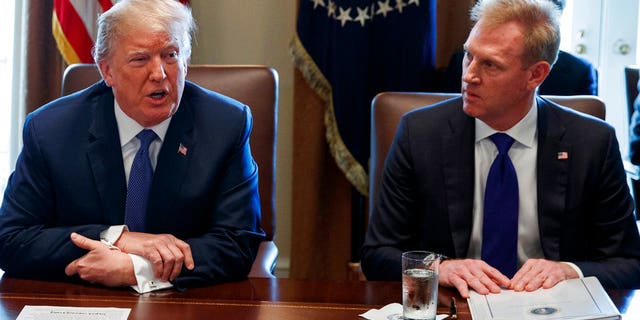Deputy Defense Secretary Patrick Shanahan will take over as
acting secretary on Jan. 1 to cover the accelerated departure of Jim
Mattis, President Trump said Sunday in a tweet.
(U.S. Army / Monica King)
President Trump on Sunday said deputy defense secretary Patrick Shanahan will take over as acting secretary of the department on Jan. 1 to cover the accelerated departure of Jim Mattis — after a string of disagreements between Trump and Mattis.
“I am pleased to announce that our very talented Deputy Secretary of Defense, Patrick Shanahan, will assume the title of Acting Secretary of Defense starting January 1, 2019,” Trump wrote on Twitter Sunday morning. ”Patrick has a long list of accomplishments while serving as Deputy, & previously Boeing. He will be great!”
Read on for a look at five things you should know about Shanahan.
His role is unusual.
Lt. Col. Joseph Buccino, a spokesman for Shanahan, said the former Boeing Co. executive will accept the appointment as acting secretary.“Deputy Secretary will continue to serve as directed by the president, and the Department of Defense will remain focused on the defense of the nation,” Buccino said on Sunday.
It is unusual for the Pentagon to have an acting secretary of defense. Historically when a secretary has resigned, he has stayed on until a successor is confirmed. For example, when Obama-era Defense Secretary Chuck Hagel announced his resignation in November 2014, he stayed in office until Ash Carter was confirmed the following February.
He was a Boeing “fix-it” man.
Shanahan, a former Boeing Co. executive, was nominated for the job of deputy defense secretary in early 2017.He'd moved up through the management ranks at Boeing over a career that began in 1986. The Puget Sound Business Journal called him a Boeing “fix-it” man in a March 2016 report. He oversaw the company’s global supply-chain strategies and use of advanced manufacturing technologies. Shanahan was central to getting the 787 Dreamliner on track after production problems in the program’s early years, the report said.
The pedigreed engineer, according to his bio, has two advanced degrees from the Massachusetts Institute of Technology: a Master of Science degree in mechanical engineering, and an MBA from MIT’s Sloan School of Management.
His father, a military vet, taught him manhood is about “service before self.”
Shanahan is the son of Vietnam veteran Mike Shanahan, who served in the U.S. Army. “He returned home and continued his selfless service to his fellow Americans with another 25 years in law enforcement,” Shanahan said, according to an October 2017 article on the Department of Defense’s website. “Growing up, my understanding of the war came from my Dad, his friends and the few stories they would share.”The Washington state native also said during his confirmation hearing before the Senate Armed Services Committee that his veteran father raised him and his younger brothers with the American ideology of “service before self.”
Before Shanahan was confirmed by the Senate in a 92-7 vote, the late Arizona Sen. John McCain said he wasn’t overjoyed that a defense industry executive with no prior military experience would come to lead the Pentagon.

“I am pleased to announce that our very talented Deputy Secretary of Defense, Patrick Shanahan, will assume the title of Acting Secretary of Defense starting January 1, 2019,” President Trump tweeted Sunday morning. (AP Photo/Evan Vucci, File)
Trump and Pence like him.
The Hill reported that Shanahan wasn’t close with Mattis; however he is liked by the White House.“He’s not a policy or geopolitics guy. He’s a business guy,” a source told Defense News. “But he’s spent the last year learning from the best. And Shanahan is known for having a good relationship” with Trump and Vice President Mike Pence.
The Hill reported that Shanahan frequently visited Trump and Pence as project leader within the Pentagon of the proposed Space Force military service.
He believes the Pentagon’s focus is “to increase our performance on lethality, alliances, and reform.”
“Too often we focus on process, or budget, or level of effort,” Shanahan told Defense News. “The Pentagon should focus on outcomes and outputs — our performance. This focus on performance should drive us to field unmatched lethality, execute on our modernization plans and achieve this affordably.”“It’s all about the system and then the reinforcing mechanisms to make that change enduring. Without a system, things fall apart when the leader moves on,” Shanahan continued. “The system or the environment shouldn’t be dependent on the leader’s presence.”
“It’s very easy in a complex environment like this to get distracted. The tactical can consume an enormous amount of time,” he added. “But my job is really to drive change at scale and there’s a formula for doing that. And the formula really has to do with change [which] must be systemic.”
















